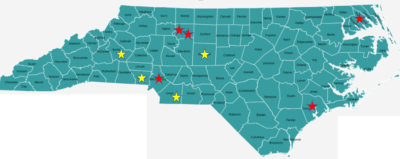This past Monday in Union County, The House Select Committee on an Education System for North Carolina’s Future held its 5th meeting to continue the task it started in January— envisioning a future for education in our state. Nine House members (6 Republicans and 3 Democrats) were appointed by the Speaker of the House of Representatives:
- Rep. John Torbett, Senior Chair (R-108/Gaston)
- Rep. Hugh Blackwell, Co-Chair (R-86/Burke)
- Rep. Pat Hurley, Co-Chair (R-70/Randolph)
- Rep. David Willis, Co-Chair (R-68/Union)
- Rep. Evelyn Terry (D-71/Forsyth)
- Rep. Brian Farkas (D- /Pitt) Replaced by Rep. Howard Hunger (D-5/Pasquotank)
- Rep. Rachel Hunt (D-103/Mecklenburg)
- Rep. Phil Shepard (R-15/Onslow)
- Rep. Jeff Zenger (R-74/Forsyth)
The geographical distribution of the members’ districts is shown with yellow stars for the locations of the chair and co-chairs and red stars for the other five members. Forsyth is well-represented with two members.

During its first meeting, Committee Chair, John Torbett introduced the committee’s work by reading its charge statement: “The Committee shall study issues related to education in elementary and secondary schools, including, but not limited to the following:
- Requirements of the standard course of study.
- Outcomes of the standard course of study, including the appropriate metrics.
- Opportunities for students to demonstrate competency at their own pace.
- Funding and outcomes of current programs, including partnerships with nonprofits, that support the standards and outcomes of a sound basic education.
- Any other issue deemed relevant by the Chair to the charge of the Committee.”
Chair Torbett stated his focus for the committee with the question, “If today there was no education system in North Carolina, and we were charged with establishing one, what would you like to see in a new education system, or not see in a new education system?”
Meetings are held every two weeks and are usually live-streamed. To promote greater participation in its deliberations, The Committee has been holding meetings at locations around the state. The local meetings have included a public comment period so members can hear from the community. So far, they’ve met in Randolph and Union counties and will meet in Gaston and Carteret counties in April. It’s not clear whether any meetings will be held in a Democratic member’s district.
A public comment input portal to collect feedback has been set up as another way for NC citizens to express their goals for NC’s future education system. We share our response about NC’s future education system below!![]()
Our Response
What should be done to improve the educational system in NC? No discussion of the future would be complete without a full understanding of the present and past. A thorough study of Sound Basic Education for All: An Action Plan for North Carolina would be a good place to start.
Public School First NC envisions a future for NC schools where the following goals have been met by a General Assembly committed to serving all North Carolinians by providing a high-quality education for our children.
- Fully fund all components of the Leandro Comprehensive Remedial Plan.
- Use public tax dollars exclusively for public schooling with consistent accountability and policies. No public tax monies for private schools.
- Increase teacher salaries to at least the national average and restore Masters pay.
- Pay all school personnel a livable wage.
- Strengthen and diversify North Carolina’s teacher pipeline: better salaries & benefits, better working conditions, and better retirement plan.
- Increase the numbers of helping professionals in schools and adopt universal trauma-informed curricula/programs that focus on social and emotional learning.
- Hire more school social workers (pay them on the Masters Pay Schedule like other specialized support staff).
- Hire more school counselors, school psychologists and school nurses.
- Provide universal access to high-quality Pre-K.
- Increase funding for special education students.
- Improve integration and the equitable distribution of all school resources.
- Create safe and supportive learning environments for all students and teachers.
- Eliminate the digital divide.
- Decrease class size in grades 4-5 by putting the cap back on the number of students allowed in each 4th and 5th grade class.
- Provide a teacher assistant (instructional assistant) in every K-3 classroom.
- Provide universal meals (free breakfast and lunch) at all schools for any student who needs it.
Read more about our legislative agenda.
